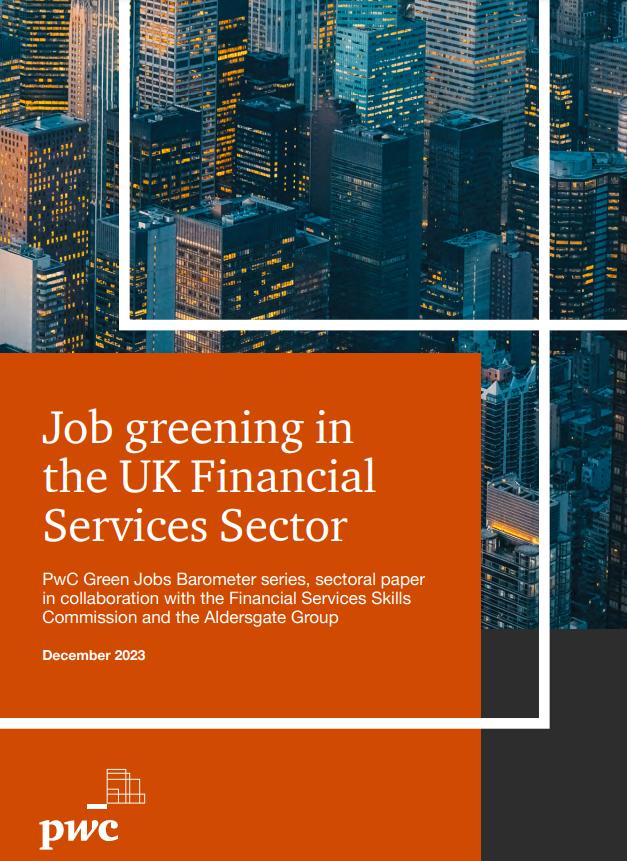20 Dec 2023
Green skills gaps across Financial Services sector risks Net Zero goals
The UK financial services sector faces an emerging green skills gap and is not moving fast enough to close it

The UK financial services sector faces an emerging green skills gap and is not moving fast enough to close it, jeopardising the UK’s Net Zero goals, according to the latest report by PwC in its Green Jobs Barometer series.
The report, in collaboration with Financial Services Skills Commission (FSSC) and the Aldersgate Group, explores the pivotal role of the Financial Services sector in achieving a Net Zero future and how it’s fuelling a rising demand for green jobs in the industry.
The report finds the proportion of job vacancies in the sector that are identified as green increased from 0.26% in the 2019-2020 timeframe to 2.2% in 2022-2023, growing from a total of 4,900 jobs to 16,700. Given the scale of the green investment needed to meet Net Zero goals, in the UK and globally, this growth is expected to accelerate.
The growth in green job openings has been driven by two factors: the creation of new green jobs in the finance sector such as sustainable investment analysts, climate strategists and ESG analysts and the greening of existing jobs. For example, portfolio managers in asset management have expanded their roles beyond conventional tasks and their duties now encompass tasks like analysing ESG fund trends and producing and evaluating climate risk assessments for client portfolios.
Claire Tunley, Chief Executive, Financial Services Skills Commission comments:
“Technological change and the increased focus on green finance requires enhanced knowledge and capabilities in the workplace to enable green transition. This is why the Financial Services Skills Commission and its members, including PwC, are calling for firms to equip employees with the skills and knowledge they need. This is critical for the sector to retain talent, unlock productivity and achieve Net Zero”.
Carl Sizer, Head of Regions, PwC UK, said:
“The upskilling of the FS sector is essential to meet the demand of green jobs, net zero targets and the UK ambition of becoming the world’s first Net Zero-aligned financial centre. We must recognise that financial services will be a driving force underpinning the transition and we need to ensure we have the skillset there. Moreover, it’s good for the environment, good for the economy and presents an opportunity by creating opportunities that are accessible to all.”
While the demand for green finance jobs is on the rise, significant regional disparities exist in the prevalence of these roles across the UK. London and Edinburgh have emerged as global leaders in green and sustainable finance, attracting talent and investment that has fueled substantial growth in their green economies. London has the largest absolute number of green financial job openings at 7,000 in a year, while Scotland, with total green job openings of 2,200 shows the highest proportion of its job openings that are green (5.6%, vs. 2.6% in London). By contrast, Northern Ireland lags behind with only 150.
As the demand for green talent and skills continues to grow, the supply of green talent both from new entrants and the existing workforce is failing to rise with it and a green skills gap is emerging. The total number of green job vacancies stood at nearly 17,000 in 2023 and it’s estimated that graduates with sustainability skills would only be able to fill 900 of these vacancies. The rest of vacancies will need to be filled by retraining the current workforce.
The shortage of new green talent can be attributed to several factors: the absence of green knowledge and skill integration in traditional finance degree programs, a knowledge gap among students regarding green skills and available career paths in this field, and graduates with green skills choosing to work in industries they perceive as better aligned with their values.
Carl Sizer, Head of Regions, PwC UK, added:
“As green and nature finance continues to grow, the pressing green skills gap needs to be addressed. Collaboration between government, educational institutions and the financial sector is essential to meet Net-Zero objectives and promote sustainability in finance. For graduates and students green skills are no longer a niche specialisation, but core to jobs in financial services, not something traditionally associated with sustainability. And for the existing workforce – effective and comprehensive green reskilling and upskilling takes time, so investment in resources and training should commence straight away.”
James Fotherby, Senior Policy Officer, Aldersgate Group, said:
“Addressing the green skills shortage in the finance sector is essential if the UK is to both meet its ambition of becoming the world’s first Net Zero aligned financial centre and maintain the sector’s competitiveness globally. A clear plan is vital to tackle this issue and ensure that the economic and job creation opportunities that the net zero transition presents for the sector are capitalised on.”
Download the report here





